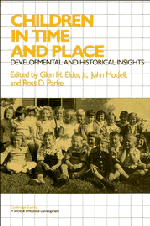Book contents
- Frontmatter
- Contents
- Preface
- Acknowledgments
- List of contributors
- Part I A proposal
- Part II Historical and life transitions
- Part III Life transitions across historical time
- 5 Problem girls: Observations on past and present
- 6 Continuity and change in symptom choice: Anorexia
- 7 Fathers and child rearing
- Part IV The cross-disciplinary collaboration
- Bibliography
- Author index
- Subject index
5 - Problem girls: Observations on past and present
Published online by Cambridge University Press: 03 May 2011
- Frontmatter
- Contents
- Preface
- Acknowledgments
- List of contributors
- Part I A proposal
- Part II Historical and life transitions
- Part III Life transitions across historical time
- 5 Problem girls: Observations on past and present
- 6 Continuity and change in symptom choice: Anorexia
- 7 Fathers and child rearing
- Part IV The cross-disciplinary collaboration
- Bibliography
- Author index
- Subject index
Summary
Sexual precocity in itself is no longer considered to be a crime for girls.
Steven Schlossman and Robert B. Cairns (1992)In areas of social inquiry where there are few precedents and fewer data, one has an unusually free hand to be methodologically inventive. This chapter plays that hand with some abandon: we link data from two different time periods, locales, and institutions to sketch broad patterns of change and continuity in family characteristics, behavior, and social treatment of problem youth – with a focus upon girls – during the past half century.
If our methods seem unorthodox, that derives largely from necessity. Today as in the past, no research tradition has emerged to advance knowledge of girls who seriously misbehave and/or are adjudged formally delinquent. Few data have been regularly collected that are related to the subject. The absence of scholarly interest in problem girls – whether by historians, social workers, psychologists, psychiatrists, sociologists, criminologists, or educators – highlights the wider neglect and marginality of girls per se in social science research. Only when girls act out and/or become formally delinquent has the scholarly community, and society at large, shown sustained interest in them and recognized a need to develop appropriate and remedial responses. There are some exceptions, of course, including the important work of P. C. Giordano (1978) and her colleagues (Giordano, Cernkovich, & Pugh, 1986).
Changing times and some issues of comparison
Profound shifts have occurred during this century in the social expectations and legal machinery society uses to encourage conforming behaviors by girls and to punish nonconforming ones.
- Type
- Chapter
- Information
- Children in Time and PlaceDevelopmental and Historical Insights, pp. 110 - 130Publisher: Cambridge University PressPrint publication year: 1993
- 11
- Cited by

